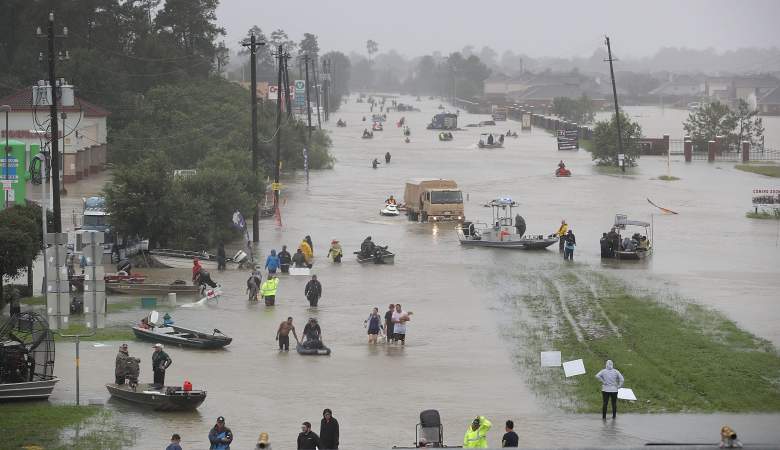
Getty People walk down a flooded street as they evacuate their homes after the area was inundated with flooding from Hurricane Harvey on August 28, 2017 in Houston, Texas.
As residents of Texas deal with the fallout from one of the most powerful hurricanes to hit the United States in a decade, many want to know if it is over. The Hurricane is officially over. In fact, Harvey was technically downgraded from a hurricane to a tropical storm on Saturday, August 26, just one day after hitting the Texas coast late the previous night.
That didn’t mean that Harvey was any less destructive, as the tropical storm caused major flooding due to heavy rainfall. Harvey made landfall three times since Friday — once as a hurricane and twice as a tropical storm.
Harvey Timeline
August 23, 10 a.m.
Harvey is a tropical depression about 535 miles southeast of Port O’Connor, Texas, with maximum sustained winds of 35 mph.
August 24, 1 p.m.
Harvey became a hurricane with maximum sustained winds of 85 mph, at about 325 miles southeast of Port O’Connor. By midnight, it was upgraded to a Category 2 hurricane with maximum winds of 100 mph.
August 25, 6 p.m.
At 6 p.m., Harvey became a Category 4 Hurricane, its peak strength. Harvey was just 45 miles from the coast with sustained winds of 130 mph. Meteorologists predicted about 40 inches of rain or more in some areas. At 10 p.m., Harvey made landfall as a Category 4 hurricane when the eye of the storm came ashore between Port Aransas and Port O’Connor.
August 26, 2 a.m.
Harvey was downgraded to a Category 3 Hurricane with sustained winds of 90 mph. Hours later, it was downgraded to a tropical storm.
August 30
Tropical Storm Harvey was downgraded to a tropical depression late Wednesday as it moved away from the coast and weakened.
Harvey became one of the most powerful storms to hit the mainland in over a decade. Harvey’s massive rainfalls, devastating winds and widespread flooding have caused at least 39 deaths and drove over one million people to evacuate their homes.
Harvey has dropped and estimated 20 trillion gallons of rain on the Houston area after Harvey came ashore. That’s enough water to supply New York City’s needs for over five decades. Cedar Bayou, located on the outskirts of Houston, recorded a record rainfall for a storm in the continental U.S., according to the National Weather Service.
Harvey is projected to be at least the second costliest storm in US history. Moody’s Analytics predicts the cost of Harvey will be $108 billion in destruction and losses.